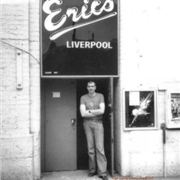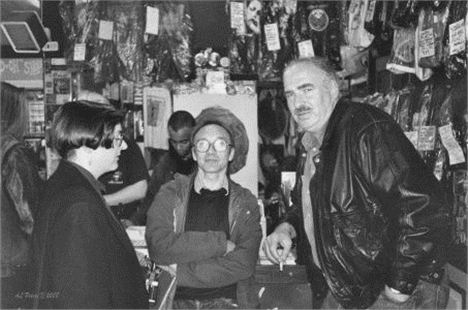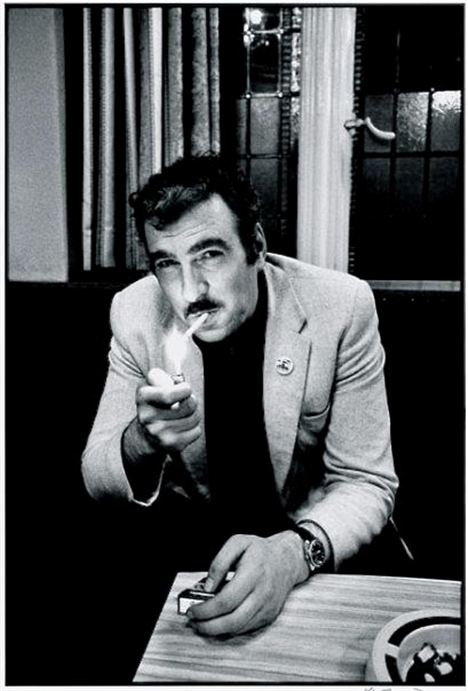ROGER Eagle, accurately described by author Bill Sykes as a “maverick rock'n'roll evangelist”, will be remembered by many in both Liverpool and Manchester as a local legend. In this book, he's remembered, in more rounded terms, by people who knew the real person.
Bill Sykes was a friend and neighbour of Roger's, and a musician whose band Roger managed. This book is his labour of love.
Sykes carried out over 50 interviews for the book: Liverpool people like Geoff Davis, Steve Hardstaff and Norman Killon; Eric's people like Doreen Allen, Jayne Casey, and Bill Drummond (as well as co-owners Ken Testi and Pete Fulwell); Manchester people like Elliot Rashman, CP Lee and the late Tony Wilson; as well as Roger's brothers.
There are also extracts from two interviews from the mid-90s with Roger himself, characteristically insightful about music and the music business. The book is composed mostly of verbatim chunks of these interviews: some repetitive, some contradictory (because that's the nature of memory) but adding up to a fairly consistent portrait.
The work that's gone into this is impressive. There's even a 'Gigography', which I'm sure many readers will turn to first. This can, though, be a frustrating read: the book could have benefited from a copy-editor (or, at the very least, a proofreader). At times it feels like a demo tape in need of a producer. Or, to use another musical analogy, a double album with a good single LP trying to get out.
As a book, it's flawed. But as a tribute, it's excellent.
The young Roger Eagle was a public-school rebel from Oxford who discovered rock'n'roll and ran away to the north. He once declared “I’m a southerner by birth – but a northerner by emotion.”
 King of the kingdom He went on to inspire a generation of mods, a generation of punks, and many others through his work as a DJ and promoter at legendary venues like the Twisted Wheel, Magic Village and International in Manchester, the Stadium and Eric's in Liverpool. The buzz of shared musical passions comes across vividly in the descriptions of those days, as interviewee after interviewee testifies to the impact Roger's work and personality had on their life.
King of the kingdom He went on to inspire a generation of mods, a generation of punks, and many others through his work as a DJ and promoter at legendary venues like the Twisted Wheel, Magic Village and International in Manchester, the Stadium and Eric's in Liverpool. The buzz of shared musical passions comes across vividly in the descriptions of those days, as interviewee after interviewee testifies to the impact Roger's work and personality had on their life.
Much of his musical influence is a matter of record, but less has been known about his personal life. Sykes describes Roger as “a sensitive and very private person” and that may be why.
Like many of the young punks at Eric's, I found Roger so intimidating that I don't think I ever spoke to him during that period. Later, our paths crossed professionally from time to time but I never really got to know him.
It's something of a shock to find that there were times in his life that were difficult; periods, particularly after the closure of Eric's... The commanding figure many of us remember
was not always in command
You got the impression that Roger would always rather talk about music than about himself. He liked to tell anecdotes about musicians; stories from the many memorable occasions when he met his musical heroes. A lot of the anecdotes seemed to involve gun-toting bluesmen.
This book has plenty of anecdotes about the man himself. My favourite is the one from the early 60s when he was DJ at the Twisted Wheel. The Rolling Stones, fresh from releasing their first album, turned up in the club. Roger played every song from the album, in order – but not the Stones' versions, the originals.
That says something about Roger Eagle the music fan. Other stories are more revealing about Roger Eagle the man. Like the time Doreen Allen found Roger in the Eric's office dismantling chairs to take home for firewood, because he'd exhausted the supply of stair rails and floorboards in his derelict flat.
Or the time he ran away to Bristol with a Swedish woman from Beaumaris and the jukebox from Eric's and opened up a “fantastic” restaurant with no customers.
These kinds of stories are entertaining when they are about a “legend”: less so when you think of them happening to a real person.
To many people, Roger Eagle was a larger-than-life mythical figure. It's something of a shock to find that there were times in his life that were difficult; periods, particularly after the closure of Eric's, when he was down on his luck and struggling to find a new niche. The commanding figure that many of us remember was not always in command.
 Penny Kiley, way back when, in Probe with Norman Killon and Roger
Penny Kiley, way back when, in Probe with Norman Killon and Roger
A purist with little time for the music business, Roger was never cut out to be an entrepreneur and a recurring theme in the book is what Sykes puts as “his inability to deal sensibly with money”.
Like the musicians he loved, it appears that he also lost out on occasion to some who were more business-minded than him. But, unlike the money men, he is the one who will be remembered.
It's to Bill Sykes' credit that this book doesn't just “print the legend”. The picture you get here is mixed: interviewees describe Roger as imposing, kind, scary, aloof, eccentric, forthright, overbearing, formidable, enthusiastic, intelligent, knowledgeable. They call him a rebel, an outcast, a pioneer, and – over and over again – an educator.
Above all it's the passion for music that comes across, and the equally strong impulse to pass it on – hence the title of the book.
His knowledge of blues, reggae, rockabilly and more was encyclopaedic, but it was felt as much as learned. In a world where the likes of Paul Gambaccini are considered experts, we need more people like Roger Eagle.
*Sit Down! Listen to this: the Roger Eagle story by Bill Sykes, Empire Publications, is published on July 17, £18.95. More details to be announced shortly.
Penny Kiley's blog Older Than Elvis can be found here and you can follow her on twitter here














